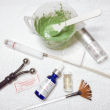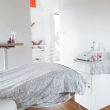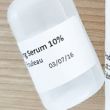If ITG were to have a mascot, and that mascot was a facialist instead of a cartoon character, I'm relatively certain we would draft Renée Rouleau for the job. Even among the Joelle Ciocco's and the Isabelle Bellis' of the world, Renée has cast something of a spell over the whole team since we first discovered her miraculous Anti-Cyst Treatment way back when. Renée, it turned out, didn't just have great products, she is a veritable tip hotline for problematic skin, too—Tom spent an hour on the phone with her once discovering the difference between AHAs and BHAs. Her specialty is balancing acne-prone skin, with a side of helping everyone discover their own bespoke skincare routine. For this entry in our Facialist series, we asked Renée to focus on just that because, whether you have acne, just occasional breakouts, or a cabinet full of spot treatments you don't know what to do with, you deserve answers.
Not all acne is created equal
Which means acne treatments are not one size fits all. "people fall into the trap of not knowing how to treat their specific type," Renée says about the no. 1 misunderstanding people have about their skin. "And determining the cause can be tricky especially if you are someone who typically eats well and takes good care of their skin." While your impulse might be to dry all of your skin out, it's important to remember that acne is an inflammatory disease of the skin. Focus on incorporating calming products along with bacteria-reducing ingredients to address your concerns.
You can outgrow your acne routine
"There comes a time in a young woman’s life when breakouts start to become few and far between," Renée says about what sounds like a very lovely stage of life. "Yet many people make the mistake of continuing to use a skin care routine carried over from their teen years thinking that if they stop using that routine, their blemishes will all come back." But that's the wrong way to think about it! If your skin changes, so too should your products. The acne leftovers are probably too strong and drying, especially if it's time to start thinking about incorporating some preventative anti-aging products into the rotation.
Don’t dry up that zit
On this subject, Renée is most clear: "Whenever a blemish appears, the goal is to get it to heal quickly. Most people have a myriad of zit-zapping spot treatments in their bathroom and will apply these generously the moment a blemish pops up in hopes of drying it out to get it to go away more rapidly. But most spot treatments actually make the blemish stick around longer when used in this way. It will also lead to a prolonged recovery time with scarring." The reason is that when used too early, the drying lotion will dry out the skin on top of the infection, actually trapping the infection from coming out. "Have you ever tried to squeeze a blemish that has been dried out with a spot treatment? I’m sure you’ve experienced sheets of skin peeling off which will result in more scarring. Not good," Renée says. "The best solution is to leave it alone to get rid of it faster." Frustrating, but probably true.
But you can pop it properly
There's always a time and place for everything, including this. When you finally spot that whitehead, "you can gently squeeze it out as long as it comes out in one or two tries," Renée specifies. "Anything more than that means it wasn’t ready to come out and you will injure the skin resulting in a red or dark scar." If you choose this path, make sure you wrap your fingers in tissues and prep the blemish with a warm, damp washcloth for two minutes can soften up the skin to make for an easier extraction. Once the whitehead is removed, NOW you can dab on a zit-killing lotion (Renée makes a Night Time Spot Lotion for this sort of thing) to dry out any remaining bacteria to help close up the skin.
Moisturizer is never the enemy
You just have to work harder to find the right one for you. Renée mentions that many of her clients with acne-prone skin are paranoid about using moisturizer, thinking that it will immediately clog up their pores and not let the skin “breathe." "For starters, wearing moisturizer does not cause breakouts," Renée clarifies. "Acne happens when the cells that line the inner pores fail to fall off properly, clogging the pore. This happens whether you moisturize or not. Secondly, your skin doesn’t perform the function of respiration, so the concept of your skin breathing is false." Everything you thought you knew was wrong! Or not—but either way, you should moisturize. No matter what.
—Emily Ferber
Photographs via Renée Rouleau.
Next up: Read more skin tips from Jenna Lyons' facialist and the woman who handles Chrissy Teigen's face.

















